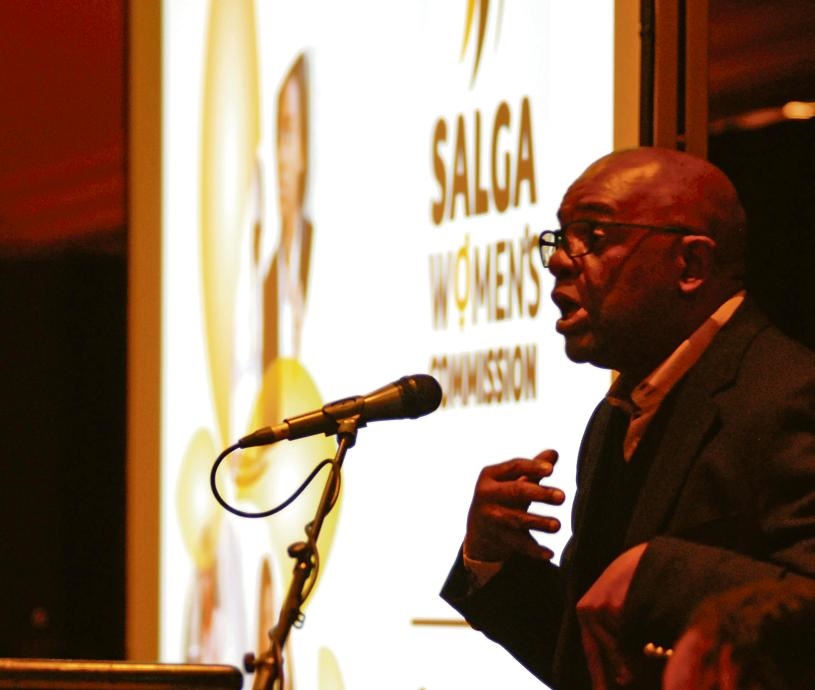Women’s Commission summit focuses on overcoming hurdles to increase female representationin local government
The empowerment of women took centre stage at the SA Local Government Association (Salga) Women’s Commission summit in Ekurhuleni, Gauteng, this month.
One objective of the Women’s Commission is to increase the representation and participation of women in local government.
The target that was set ahead of last year’s local government elections to have 50% female and 50% male councillors was missed, but female representation stands at its highest since South Africa attained democracy – it is presently at 41%, after a slight dip to below 40% in the 2011 municipal elections.
Welcoming delegates to the summit, Salga deputy president and the executive mayor of Emalahleni in Mpumalanga, Lindiwe Ntshalintshali, said: “Since its inception in 2010, the Salga Women’s Commission has been a reflection of Salga’s mandate to coordinate, promote and advocate for gender appropriate strategies and practices within member municipalities, and feed into regional, continental and global processes.”
Among its many tasks, the commission has to identify specific social, economic, political, legal and cultural constraints hindering the full participation of women in local governance structures.
It also has to advocate for the building and strengthening of partnerships with civil society, especially with female empowerment groups, and create access to training and capacity building by women in local government leadership positions.
Ntshalintshali reminded the female councillors from municipalities across South Africa of the need for the development of a programme and plan of action for local government.
The commission has to monitor programmes designed to promote the inclusion of women in local government and provide annual reports on progress made.
Salga chief executive Xolile George, billed as “the thorn among the roses” alongside Salga president Parks Tau, said the summit was an important milestone after more than five years of trying to formalise the process of addressing gender equality within local government.
George said it was appropriate to place women at the centre of local government as they had a keen appreciation of service delivery challenges.
He pointed out that strengthening female representation could help shape policy at a national level.
George confirmed that Salga had reserved a seat on its national executive committee for the national women’s commissioner elected at the summit.
He also noted that the range of issues that the Women’s Commission needed to address should not be boxed in as “women’s issues” because the commission would help Salga explore a range of technical and policy issues.
One of these was the payment of councillors from the national fiscus and the long-term improvement of remuneration for councillors in smaller municipalities.
George said that such an improvement in pay and conditions would benefit female councillors as they tended to extend their income to a wider range of beneficiaries.
The commission must also advise local government on the adherence to international programmes, such the Sustainable Development Goals, where goal number five deals with gender equality.
The summit was addressed by a range of speakers who work in and outside local government.
Gender activist Mbuyiselo Botha gave the keynote speech and urged delegates to focus on matters affecting women through a women’s government department.
“Few governments create structures that focus on women, and the gains we have made as a country should not be forgotten,” he said.
Botha said women were “at the coal face of gender struggles” and bore the brunt of poor service delivery.
“The Women’s Commission needs to be well resourced. Otherwise, it is being set up for failure,” he said.
Botha noted that “the struggles faced by women in local government were the same struggles faced by women globally”, and he urged the commission to be “purposefully deliberate and focused in its objectives”.
Addressing gender struggles was an incremental process, Jenny Schreiner, the director-general in the department of women, said. She added that countries that did not recognise the potential of half the population – their women – would not reach their full development potential.
Schreiner noted that her department provided thought leadership, advocacy and monitoring through partnerships. She urged Salga to support its campaigns through the Women’s Commission.
One such campaign is called She Conquers, which is aimed at countering teenage pregnancy and stemming new HIV infections, which immoderately affect teenage girls.
Schreiner said economic freedom should be the ultimate goal. “Financial inclusion is key. Government must give women access through integrated development plans for them to start businesses and participate in development.”
Ntshalintshali urged delegates not to lose sight of the need for continued evaluation of the representation of women within the local governance structures, as well as the continued assessment of the relevance of policies and legislation designed to address and promote increased female participation.
These include building and strengthening of partnerships with various stakeholders, especially female empowerment groups, and participating in national and regional forums to promote the united voice of women in local government.
The summit ended with a pledge to lead the fight against patriarchy “finding expression and imposing its suppressive, exploitative and oppressive measures” on women.
It was also agreed that the fight against the institutionalised mistrust of female leaders, and the dominance of men in media and other spaces would be stepped up.
Delegates also pledged to fight gender-based violence “in all its forms – verbal and physical – and in all spaces – private and public”. The fight against HIV and Aids would also continue unabated.
Another resolution revolved around the empowerment of women for the enhancement of their dignity; the representation of women in critical domains of development; the transformation of women for improved mutual support; and the mentorship and upliftment of all women, regardless of age and social status.
The commission enjoys the status of a Salga working group in its funding, and the commission’s chairperson also sits on the Salga national executive committee.
At provincial level, the commission is represented by one female councillor from each district and metropolitan. The provincial structure then constitutes an executive and elects a chairperson.
The provincial structures then form the national executive committee of the commission, which is chaired by a national commissioner.




 Publications
Publications
 Partners
Partners










